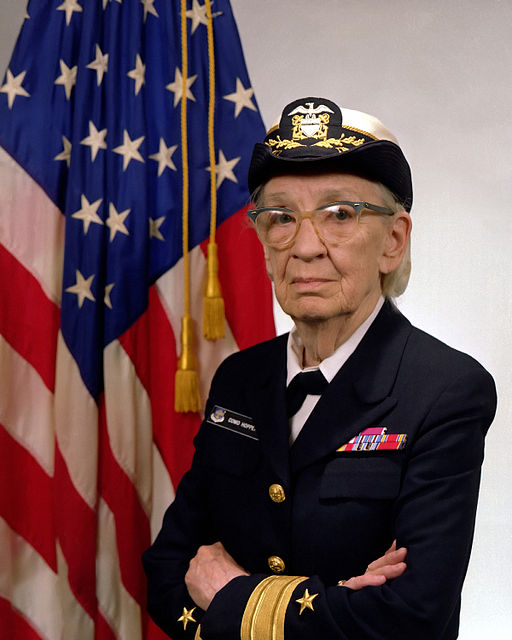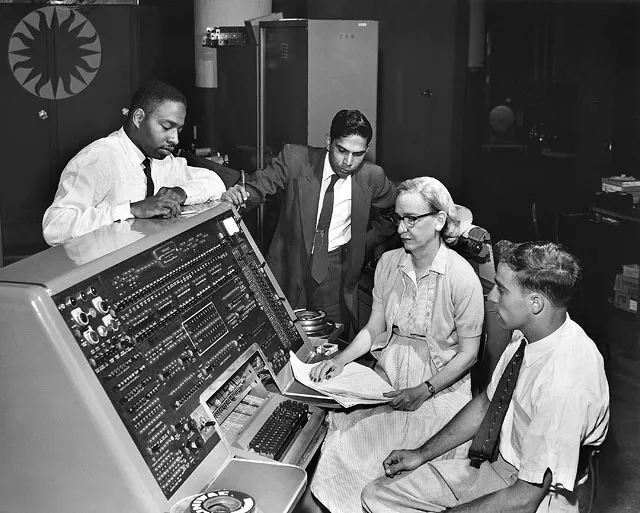If you are a computer programmer or just interested in the pioneers of modern technology, you may have already heard the name Grace Hopper. But despite her wide-ranging contributions to computer science and technology, she is far from a household name. Whether you know her name or not, however, you’ve almost certainly benefitted from the work that she did. If you’ve ever used a computer compiler, you’ve used her innovation; and, even if you aren’t a programmer, you’ve probably used the term “debug,” which she was responsible for popularizing and you’ve almost certainly used a piece of technology that uses the COBOL language, which she helped to develop. Hopper had a long and varied career during which she made many contributions to the field of computer science starting well before it was a recognized discipline.
Hopper started working with computers as part of her service to the Navy through the WAVES (“Women Accepted for Volunteer Emergency Service”) program during World War II. At this time, she worked as part of the Mark I project team at Harvard University, where she was integral to work that supported the war effort and contributed to the Manhattan Project. When she wasn’t able to continue in the Navy after the war, she went into private industry, working on the UNIVAC and developing a compiler. Based on her belief that users should be able to write computer programs in English rather than using complicated symbols and mathematics, she was also instrumental in the development of the programming language COBOL, which could work across machines. With all of these impressive accomplishments and many more, it may seem as though the only thing Hopper wasn’t good at was retiring, something she tried three times before it stuck with her final retirement at the age of 79.
Given Hopper’s fascinating career, it might not be surprising that FiveThirtyEight decided to produce a documentary about her for their Signals series. The film, titled Queen of Code, is the directorial debut of Gillian Jacobs (if that name sounds familiar, it may be because she plays Britta on the show Community) and it captures not only Hopper’s spirit but also her continuing legacy in computer science, particularly for women working in technology.

Though it only has a running time of 16 minutes and 31 seconds, the film manages to cover many of Hopper’s most important accomplishments starting with her time as a math professor at Vassar and her work on the Mark I team at Harvard. Newsreel clips from World War II, archival photos of the Mark I team, and historic documents such as Hopper’s enlistment forms, help to take viewers back to this time period and remind them of a time before computers became so prevalent. By using several clips of Hopper speaking at various events, the film also gives viewers a glimpse of the woman behind all of these accomplishments. Her voice, demeanor, and attitude come through loud and clear both through these videos and through the commentary offered by her biographers, Kathleen Williams and Kurt Beyer, and other experts. As Williams says, “Even though she was a trailblazer, she never admitted that a trail needed to be blazed.” All of these elements help to humanize Hopper rather than making her seem like a larger than life figure.
Throughout the film, women in the field of computer science, including Maria Klawe, the president of Harvey Mudd College, and Megan Smith, the Chief Technology Officer of the United States, discuss the importance of Hopper’s work, which helps to put Hopper in the context of her impact on modern day computer science. Highlighting women who have followed Hopper in these fields also brings in multiple perspectives on the true magnitude of what she achieved and showcases how the field has continued to develop in the wake of her work, including the debut of the Grace Hopper Celebration, an event for women in technology, a mere two years after Hopper’s death.
Though the short nature of the film means that many aspects of Hopper’s life are abbreviated and can at some points slightly muddle the specifics of her work, overall, it offers an accessible and engaging look at Hopper’s work and the long-term impact that she has had. Queen of Code is a good introduction to not only Hopper’s life but the work that was done by women in the early days of computing and it will hopefully leave viewers interested in finding out more about this history. The full film is available for free online through FiveThirtyEight’s Signals series and it is a perfect viewing option for Women’s History Month!
Carli Spina is a librarian and in her spare times writes frequently about technology, graphic novels, young adult literature, and other pop culture topics. You can find her on Twitter as @CarliSpina.
Are you following The Mary Sue on Twitter, Facebook, Tumblr, Pinterest, & Google +?








